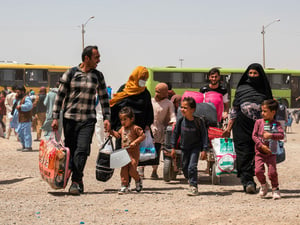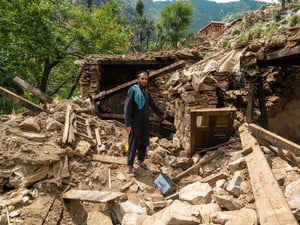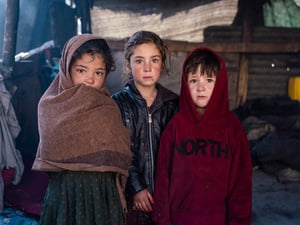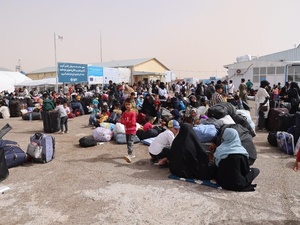UNHCR assists hundreds of displaced Iraqis at border with Iran
UNHCR assists hundreds of displaced Iraqis at border with Iran

Some of the UNHCR tents distributed to displaced families in the Gojar region near the border Iraq-Iran.
GOJAR, Iraq, July 27 (UNHCR) ¬- The UN refugee agency, partner organizations and the Iraqi government are helping more than 800 people recently displaced by cross-border shelling on the frontier with Iran.
At least 845 Iraqi civilians from 175 families have been staying in two settlements in the mountainous Gojar area of Iraqi Kurdistan's Sulaymaniyah Governorate since fleeing from border areas in mid-July. Most are women and children.
UNHCR has distributed tents and plastic sheeting to the displaced, while other humanitarian groups have given food, mattresses, water filtering machines, stoves and kitchen sets. Local authorities report that an additional 100 families from seven villages in the Zharaw border district had fled their homes following shelling last week. UNHCR plans to take part in an aid distribution for these people on Wednesday.
Shelter is very important for the displaced, especially at a time when the weather is getting hotter, and people have been using branches and the shade of trees for extra cover. "The temperature is reaching 47 degrees Centigrade and it will go higher in August," explained UNHCR field officer Kamaran Ali.
"Together with the local authorities, we are trying to make sure that they can shelter from the sun and heat during the day and have access to regular clean water," he added.
Water is trucked in every day from the nearby city of Qaladiza. Ambulances and medical staff also visit the settlements when needed.
Some of the forcibly displaced people and local authorities told UNHCR that the shelling was nothing new. "This has been happening every year at the same season for many years," said Mohamed, adding that he had had to flee his village at least seven times in the past five years. Iranian troops have been in conflict with anti-government forces on the border for years.
"The difference this year is that the shelling is reaching our villages. Before this, the shells landed more in the surrounding area," said Mohamed, who was worried that he would not be able to return to his village to harvest his fields and take care of his 30 goats.

Some people have used trees and branches to provide shade for their shelters.
Most of the displaced earn a living from farming and rely on their harvests and livestock as their main source of income. Some have lost orchards and beehives due to the shelling. "We don't want to be dependent on others but we have no choice now," said Mohamed. "It is impossible to return permanently to our homes at this time."
Some were also worried about their children's education when the school term begins in September. "We just need stability for our children," said 28-year-old Aveen. "We are tired of this constant displacement."
Rasul said he was watching television in the village of Suney when a rocket hit the next room. "It was pure luck that nobody was hurt," the 56-year-old said, while showing UNHCR the damage and fragments of shell.
School buildings and several houses in Suney were also damaged by shelling. One shepherd was killed and three injured following cross-border shelling on Sunday in Sidakan, which is located in Erbil Governorate.
UNHCR is ready to provide humanitarian assistance to more displaced families in other border areas. Several hundred families are reportedly displaced in the Erbil towns of HajiOmran and Schoman. Many are staying with relatives or host families.
By Helene Caux in Gojar, Iraq







